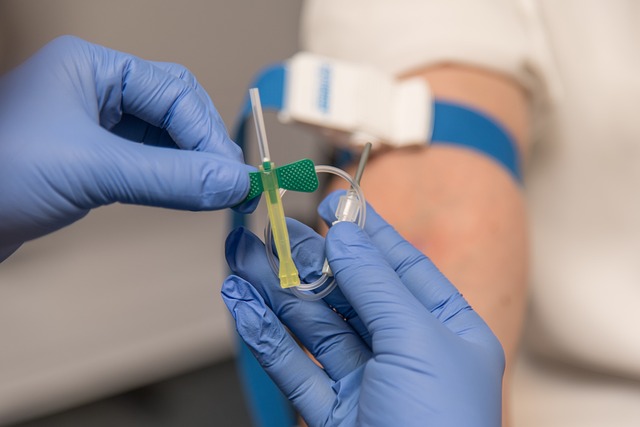In the UK, the UK Advanced Thyroid Blood Test is a vital tool for diagnosing iron deficiency anemia, a common blood disorder. By measuring key thyroid hormones, it helps differentiate anemia from hormonal imbalances like hypothyroidism or hyperthyroidism. Early detection through this test enables timely treatment, including dietary changes and precise iron supplementation, to prevent long-term health issues associated with low iron levels.
Iron deficiency anemia, a common yet serious health issue, can be effectively detected through blood tests. This comprehensive guide explores the impact of iron deficiency and emphasizes the crucial role of blood work in diagnosis. We delve into how advanced thyroid blood tests, particularly those used in the UK, offer a detailed assessment, providing insights into overall health and nutrient levels. Understanding these tests is essential for early detection and management of anemia.
- Understanding Iron Deficiency Anemia and Its Impact
- The Role of Blood Tests in Diagnosis
- UK Advanced Thyroid Blood Test: A Comprehensive Approach
Understanding Iron Deficiency Anemia and Its Impact
Iron deficiency anemia is a common blood disorder characterized by low levels of iron in the body, leading to reduced production of hemoglobin, the protein responsible for carrying oxygen in red blood cells. This condition can have significant impacts on overall health and daily functioning. Symptoms may include fatigue, weakness, pale skin, shortness of breath, dizziness, and headaches. If left untreated, it can cause more severe complications such as increased risk of infections, impaired cognitive function, and cardiac problems.
In the UK, advanced thyroid blood tests often include measurements of iron levels as part of a comprehensive health assessment. These tests are crucial in diagnosing anemia and identifying potential underlying causes, including poor diet, blood loss, or absorption issues. Early detection through these advanced thyroid blood tests enables prompt treatment, which may involve dietary changes, supplementation, or medical interventions to restore iron levels and prevent further health complications.
The Role of Blood Tests in Diagnosis
In the diagnosis of iron deficiency anemia, blood tests play a pivotal role, offering crucial insights into the health of red blood cells and hemoglobin levels. These tests are essential tools for healthcare professionals in the UK to uncover underlying causes of fatigue, weakness, and shortness of breath. One advanced test, the UK Advanced Thyroid Blood Test, goes beyond basic measurements by evaluating various thyroid markers, which can be indicative of anemia or related hormonal imbalances. By combining this test with a comprehensive review of symptoms, medical history, and physical examinations, doctors can accurately identify iron deficiency anemia and develop tailored treatment plans.
UK Advanced Thyroid Blood Test: A Comprehensive Approach
In the UK, the Advanced Thyroid Blood Test emerges as a comprehensive solution for diagnosing and managing iron deficiency anemia. This test goes beyond basic assessments by measuring various thyroid hormones, including T3, T4, and TSH (Thyroid Stimulating Hormone). By analysing these markers, healthcare professionals gain valuable insights into thyroid function, which is closely linked to overall health and nutritional status.
The UK Advanced Thyroid Blood Test plays a pivotal role in identifying subtle imbalances that might otherwise be overlooked. Iron deficiency anemia can masquerade as hypothyroidism or hyperthyroidism, making it crucial to have a thorough assessment. This test enables doctors to tailor treatments effectively, ensuring patients receive appropriate iron supplementation and thyroid management strategies for optimal health outcomes.
Iron deficiency anemia is a common yet serious health issue, and early detection through blood tests like the UK Advanced Thyroid Blood Test is vital. This comprehensive approach allows for prompt treatment, ensuring better management of anemia’s impact on overall health. By understanding the role of blood tests in diagnosis, individuals can take proactive steps towards a healthier future.
